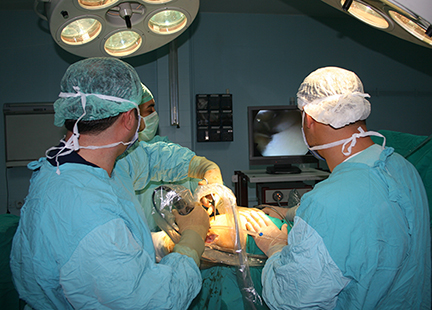 Our mission is to provide you with the opportunities that, combined with your own efforts,
will allow you to reach your goal. Orthopaedic surgery is much more than operating on patients with
broken bones, torn cruciate ligaments, arthritic hips, or herniated discs; orthopaedic surgeons are
specialists in both the operative and non-operative management of a variety of disorders of the musculoskeletal system.
Our mission is to provide you with the opportunities that, combined with your own efforts,
will allow you to reach your goal. Orthopaedic surgery is much more than operating on patients with
broken bones, torn cruciate ligaments, arthritic hips, or herniated discs; orthopaedic surgeons are
specialists in both the operative and non-operative management of a variety of disorders of the musculoskeletal system.
While no one denies the importance of learning good operative
technique, surgery may not always be the best solution.
Therefore, it is even more important to learn what treatment is best
suited for each patient’s needs. It is also important
to have an opportunity to follow patients after treatment to learn
about the normal course of recovery and the effectiveness
of the treatment. Consequently, time spent in the clinic, the
emergency room, and on the floors is just as important to the
education of an orthopaedic surgeon as time in the operating room.
At UTMB, you will be given ample opportunity to learn from
patients in a variety of settings.
One of the most challenging tasks in all of medicine is to make a decision. It is also one of the most difficult skills
to learn. In the operating room, the orthopaedic surgeon must decide when the procedure has been performed satisfactorily
and when it has not. After surgery, the orthopaedic surgeon must decide whether the patient is doing well or if some
additional intervention is needed. To help in developing your decision-making skills, our faculty is committed to sharing
responsibility with you in an incremental fashion. As your knowledge and experience increase and as you demonstrate good
judgment, increasingly complex decision-making tasks will be given to you.
Orthopaedic surgery is a dynamic specialty with new procedures being developed all the time. New knowledge about the
structure and function of the musculoskeletal system and its diseases is constantly emerging. To maintain excellence, an
orthopaedic surgeon must be a lifelong student. An orthopaedic surgeon must be able to critically evaluate new knowledge
and new methods of treatment to determine where they will fit into his or her armamentarium.